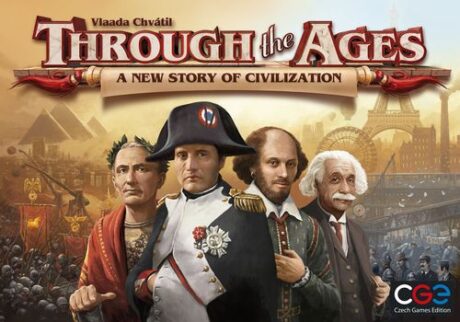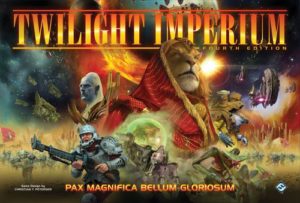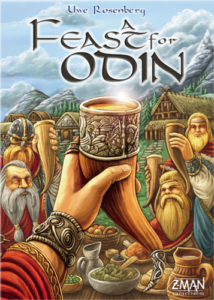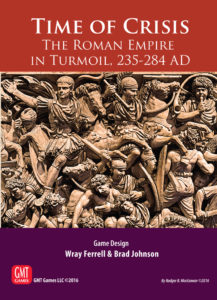- Learning time
- 90 minutes
- First play time
- 300 minutes
Through the Ages
Designed by: Vlaada Chvátil
Through the Ages: A New Story of Civilization is a pretty accurate summary of the game’s theme, where the players develop their civilisations over the four ages of antiquity, and ages I, II and III.
It’s a complicated undertaking and not one we can boil down to a rules explanation here, but we’ll give you a flavour. Each player’s turn is made up of several phases – there’s a politics phase where they can play a politics card: these can be events that will be triggered later in the game, pacts with other players, new territories to be discovered by the players (a bidding round decides the winner) or acts of aggression. There’s the action phase, where they spend their civil actions (white cubes) or military actions (red cubes) on a variety of things to improve the standing of their growing civilisation. This is the meat of the game, and involves buying civil cards from a communal pool, playing them to the table (representing knowledge) using that knowledge to build by paying resources to turn some of your workers (yellow cubes) into either a building, or military unit, generating more population by spreading across the land (costing food) or upgrading existing buildings from an old age into modern, more productive ones.
After the action phase, there’s the end-of-turn sequence, where your buildings produce more food and resources, and your urban buildings produce science (used to develop new technologies) and culture (victory points). But you need to make sure you can afford to feed your workers, otherwise there’ll be an uprising and they won’t produce any food or resources, which are vital. This can be done by keeping your workers happy – there’s a happiness marker on your individual player board, and you can improve it with certain buildings – the theatre for instance, or one of a number of Wonders.
Don’t neglect your military either – even if you have no aggressive intent yourself, having a weak military can leave you at the mercy of the other players, who may target you with raids or even war.
The communal deck of civil cards is constantly shuffling along the display, with old cards dropping off the end and out of the game, and new ones arriving at the start of your turn. At the end of each age, some older cards become defunct, any pacts are discarded and players lose some population, representing their civilisations increasing consumption. At the end of the third age, the game is over and the player with the most points wins.
We have described the New Story of Civilization here, but the previous version (without the ‘New’) is broadly speaking the same game, only the original has a more militaristic flavour.
Joe says
Through the Ages is as close as I've come to the experience of a deep, rich Civ-style computer game. It's brilliantly clever, but is it actually fun? Many modern board games borrow elements from sophisticated computer games, but the book-keeping in Through the Ages makes me feel like someone needs to invent a computer game to do it instead! It's ambitious, and it undoubtedly works, but it's too much to hold in my brain. A hugely impressive feat of game design, nonetheless.
The guru's verdict
-
Take That!
Take That!
Not the central mechanic of the game, but a large part of it. You don't necessarily need to be the strongest civilisation throughout, but you do need to make sure you don't get left behind.
-
Fidget Factor!
Fidget Factor!
Probably rather high on a first play. Dropping to moderate once everyone gets the hang of what they're trying to do, although there's a lot of card-management going on between each of your turns.
-
Brain Burn!
Brain Burn!
The rules are a beast to learn, and the first play is similar. There's so many moving parts and trying to make sure you have enough population to build and enough food to feed as well as enough science to develop and enough military to compete... the game asks a lot of you, and makes no apologies for it.
-
Again Again!
Again Again!
As long as you love the heavy, complex patterns here that require you to hold a LOT in your head, then the replayability is enormous: in different games you'll use different cards for different strategies; the politics cards add an element of surprise and potential anguish, the military aspect polices the game to an extent, as a player looking strongest in culture is most likely to be targeted militarily by their opponents.









Sam says
Through the Ages is a game that bewilders me with not just its majestic scope, but also its cleverness. The design just works in a way that does make you feel all the moving parts make sense. It's a kind of (possibly mad) genius who could come up with this, and extraordinary that it's the same designer who came up with the comparatively madcap Galaxy Trucker and the simple-but-brilliant Codenames. But for me it's a game to be respected rather than played - it's just too heavy on the brain for my personal tastes; too laden with table management, and I prefer other epics over it. Despite the utterly enormous playtime of Twilight Imperium, for instance, I found it to be more fun, and although Historia doesn't compare to Through the Ages for the thematic depth, its fast-moving play tells the story of competing civilisations in a third of the time, with half the agonising, and none of the book-keeping here: at the end of every single turn in Through the Ages cards are shuffled and discarded, cubes are moved around as production and consumption are calculated, new cards are drawn... It's brilliant, but it's also... work. Too much work for me.